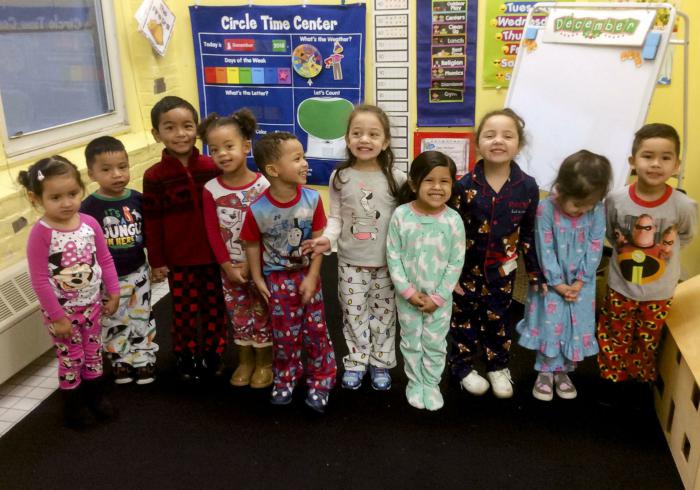Local
Forming the Future: St. Rose School, Chelsea, employs social-emotional learning strategies
By Jacqueline Tetrault Pilot Staff
Posted: 2/22/2019


Preschoolers at St. Rose School in Chelsea enjoy Pajama Day earlier this year. Pilot photo/courtesy St. Rose School
CHELSEA -- The St. Rose School faculty seeks to meet students' social and emotional needs by employing age-appropriate social-emotional learning strategies at each grade level.
Principal Michele Butler believes this focus is rooted in their mission statement, which is based on the charism of the school's founders, the Sisters of Providence: "We aspire to meet the needs of our students and their families through works of love, mercy and justice among God's people."
Speaking to the Pilot on Jan. 11, Butler said social-emotional learning strategies work for children of all ages but must be framed in different ways for each age group. The preschool, elementary school, and middle school levels use different programs and classroom techniques.
All the preschool teachers are trained in the Center on the Social and Emotional Foundations for Early Learning (CSEFEL) provided by The Lynch Foundation. The preschool teachers use a stuffed animal character, Tucker the Turtle, along with books and visual elements such as posters to teach children calming strategies, such as taking deep breaths when upset.
Teachers for kindergarten through grade 5 are encouraged to use Responsive Classroom, which Butler said includes "the hallmarks of good classroom organization and classroom management," such as morning meetings and circle time.
Kindergarten teacher Robin Gaeta recently attended a two-day Responsive Classroom training hosted by the Catholic Schools Office. The training was conducted as if the attendees were the students in a class.
"It was good because you could tap into that memory of how it was handled within the classroom," Gaeta told the Pilot on Feb. 14.
Part of the Responsive Classroom model is to begin the day with a greeting. On Valentine's Day, Gaeta did this by setting up a "receiving line," like at a wedding, where half of the students stood in a line and the other half greeted each person in line.
Gaeta said she was "excited" to learn more Responsive Classroom strategies from the materials provided at the training.
"It's an awesome resource for teachers, and I think everyone should participate in it," Gaeta said.
The middle school grades use a program called Developmental Designs. One key component of this program, Butler said, is giving students an opportunity to reflect after making a poor choice.
"Part of the reflection is recognizing why that choice wasn't the best choice at the time and identifying ways to make better choices in the future when faced with a similar situation," Butler said.
Another component of Developmental Designs is holding "advisories." Each teacher is responsible for a group of students, with whom they meet one-on-one or in small group meetings to discuss their goals and challenges.
"The kids love it, and the teachers have found it to be really beneficial," Butler said.
Each weekday morning, students arriving at St. Rose School are greeted at the door by either Principal Butler or guidance counselor Matthew Schell.
"We really focus on that relationship building, knowing each kid, and small things like that make them feel welcome and included," Butler said.
The school serves a predominantly Latino population, which Butler said is reflective of the city of Chelsea. At meetings with parents who do not speak much English, she uses PowerPoint slides with English on one side and Spanish on the other. Parents' appreciation of her efforts to communicate in their native language inspired her to do the same in her interactions with students. At the daily community gathering, she greets the students in Spanish as well as English, and she hopes to learn how to pray with them in Spanish.
"Through small gestures like that, they all know that here at St. Rose School they're loved and valued as children of God," Butler said.